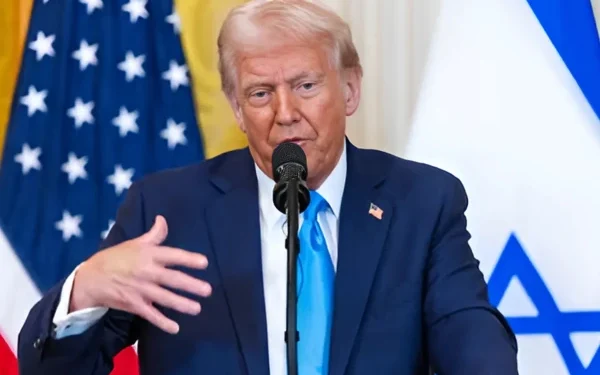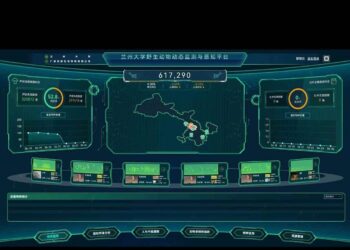In a significant and potentially game-changing statement, former U.S. President Donald Trump has hinted that the United States could become involved in the escalating conflict between Iran and Israel. Although he emphasized that the U.S. is not currently participating in any military action, his remarks suggest that Washington may play a more direct role if the regional tensions continue to intensify.
Trump’s comments come at a time when fears of a broader Middle East war are rising, following a series of retaliatory airstrikes and heightened rhetoric from both Tehran and Tel Aviv.
Trump’s Statement: “We Could Get Involved”
During an off-camera conversation with senior U.S. television journalist Rachel Scott, Donald Trump stated, “It is possible that we could get involved in this fight between Iran and Israel.” Although Trump clarified that the United States is not engaged in any military operations at present, his comment is being closely analyzed by foreign policy experts, analysts, and media outlets across the globe.
While the statement does not confirm any imminent U.S. intervention, it leaves open the possibility that the U.S. could shift its stance should the conflict escalate further.
Putin’s Possible Role as Mediator Welcomed
In an unexpected twist, Trump also welcomed the possibility of Russian President Vladimir Putin playing a role in mediating the Iran-Israel conflict. “If Putin wants to mediate, I’m open to that,” Trump reportedly said.
This is particularly significant given the strained U.S.-Russia relations in recent years. Trump’s openness to Putin’s involvement underscores the urgency and gravity of the escalating conflict in the Middle East. It also hints at a broader diplomatic approach that could involve multiple international actors trying to defuse the situation.
Tensions Surrounding Iran’s Nuclear Program
Trump also touched on the status of negotiations over Iran’s nuclear program, which has long been a point of contention between Tehran and the West, especially the U.S. and Israel. He suggested that due to the current volatile atmosphere, Iran might be more inclined to reach a nuclear agreement.
“Negotiations on Iran’s nuclear program are ongoing,” Trump said, adding that “Iran will probably be more willing to make an agreement now.”
This comment reflects a belief that diplomatic pressure amid heightened tensions could push Iran to return to the negotiation table with a more flexible stance. However, many analysts remain skeptical about the likelihood of such progress while military confrontations continue.
Iran Cancels Sixth Round of Nuclear Talks
Further complicating the situation, Iran recently canceled the sixth round of nuclear talks with the U.S., which had been previously scheduled for Sunday. Iranian officials cited the ongoing Israeli aggression and what they view as America’s passive stance as reasons for halting dialogue.
This suspension of talks is seen as a major setback to efforts aimed at reviving the Joint Comprehensive Plan of Action (JCPOA), commonly referred to as the Iran nuclear deal, from which Trump unilaterally withdrew in 2018 during his presidency.
Trump Remains Optimistic About Peace
Despite the rising tensions and military exchanges between Iran and Israel, Trump expressed optimism about the possibility of peace. In a statement posted on his social media platform, he declared:
“Peace will soon be established between Iran and Israel because several unannounced meetings are taking place and the two countries should make an agreement.”
Trump continued, stating, “Iran and Israel should make an agreement — and will make an agreement — and we will see peace soon.”
While the claim of secret meetings between Iranian and Israeli officials remains unconfirmed, it has triggered intense speculation in diplomatic circles. If true, such back-channel diplomacy could play a crucial role in preventing a full-blown war.
Drawing Parallels with India-Pakistan Diplomacy
In an effort to reinforce his point, Trump cited his past involvement in reducing tensions between India and Pakistan — two long-time nuclear-armed rivals in South Asia. He recalled how he had encouraged both nations to pursue peace by emphasizing the mutual benefits of economic cooperation and trade.
“At that time, I persuaded the two countries to make an agreement by giving the argument of trade, and the two leaders made a quick decision and ended the tension,” Trump noted.
By drawing this parallel, Trump seems to be suggesting that economic incentives and strategic diplomacy could similarly bring Iran and Israel to the negotiating table.
Global Concerns Over Widening Conflict
Trump’s statements are gaining significant traction at a time when the international community is growing increasingly alarmed about the risk of a wider regional war. The exchange of airstrikes between Iran and Israel has intensified in recent weeks, targeting military facilities, intelligence posts, and key infrastructure.
Countries around the world, including the United Nations, European Union, and China, have called for de-escalation and renewed diplomatic engagement. The U.S., under President Joe Biden, has maintained a cautious stance, urging both sides to avoid further provocation while supporting Israel’s right to defend itself.
However, Trump’s remarks add a new dimension to the evolving geopolitical situation, especially given his continued influence over American foreign policy discourse and the possibility of him running for president again in 2024.
Potential Implications of U.S. Involvement
If the United States were to become directly involved in the Iran-Israel conflict, it could have far-reaching consequences, including:
- Further Destabilization of the Middle East: American involvement could inflame tensions across the region, potentially drawing in other powers such as Russia, Turkey, and Gulf nations.
- Impact on Global Oil Markets: Any escalation involving the U.S. and Iran could disrupt oil exports from the Persian Gulf, driving global prices higher and affecting economic stability worldwide.
- Domestic Political Ramifications: Trump’s stance may deepen divisions within the U.S. political landscape, where opinions on Middle East policy remain deeply polarized.
Conclusion: A Fragile Moment in Middle Eastern Geopolitics
Trump’s comments, though informal and unofficial, underscore the fragility of the current situation in the Middle East. His openness to U.S. involvement and to international mediation efforts reflects both the urgency of the crisis and the complex web of alliances and rivalries that define the region.
As Israel and Iran continue their military confrontations and diplomatic efforts stall, all eyes remain on global leaders — including Donald Trump — to see whether peace can be brokered before the conflict spirals into a larger war.

























